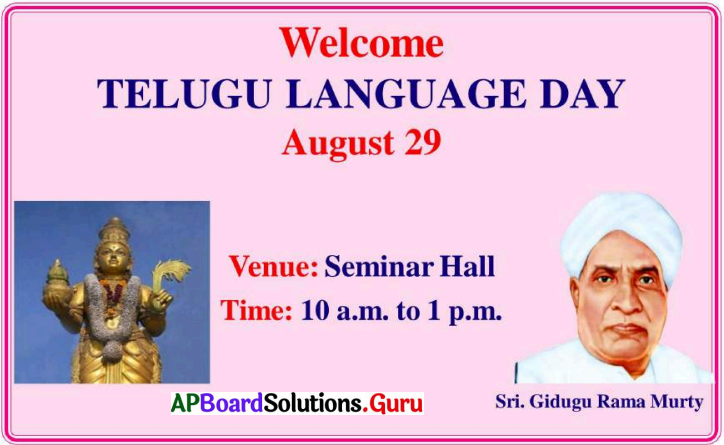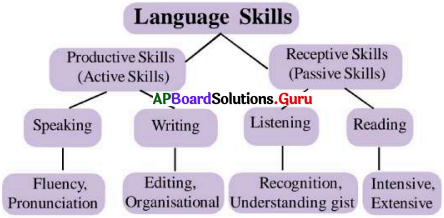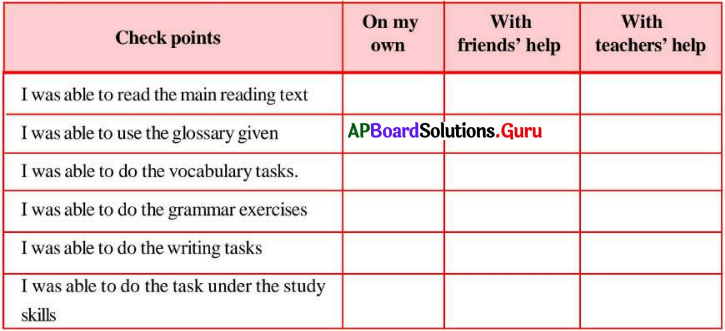SCERT AP 7th Class English Textbook Answers 8th Lesson Gurajada – The Legend Textbook Questions and Answers.
AP State Syllabus 7th Class English Unit 8 Questions and Answers Gurajada – The Legend
7th Class English Unit 8 The Gurajada – The Legend Textbook Questions and Answers
Go through the banner/poster and answer the questions that follow :

Question 1.
What is the banner about?
Answer:
The banner is about the celebrations of Telugu Language Day.
Question 2.
Why do we celebrate such days? Discuss.
Answer:
We celebrate such days in memory of great people / great events.
Question 3.
Mention some names who contributed to the society through their literature.
Answer:
Gurajada Apparao, Tagore, Gurram Jashuva, Sarojini Naidu, Gidudu Rama Murthy, Sri Sri, etc.
Question 4.
Name some writings that influence our society.
Answer:
Kanyasulkam by Cmrajada Apparao, Vemana Satakam by Vemana, Rajashekara Charitramu by Kandukur Veeresalingam, etc.
![]()
Question 5.
Do you know any Telugu writer who brought changes in the society through his/her writings?
Answer:
Srirangam Srinivasa Rao was the first true modern Telugu poet to write about contemporary issues that affected the day-to-day life of a common man. He wrote ‘Mahaprasthanam’.
Questions Given In The Lesson
Possible answers to the questions given in the middle and at the end of the lesson:
Question 1.
How do you feel when you meet great people?
Answer:
I feel proud and happy when 1 meet great people.
Question 2.
Do you preserve the letter or appreciation from anyone you love most?
Answer:
Yes, I love to preserve the letter or appreciation from anyone I love most.
Reading Comprehension
A. Answer the following questions in two or three sentences.
Question 1.
What works did Gurajada do to promote the spoken dialects?
Answer:
Kanyasulkam and Prataparudreeyam
Question 2.
Why did Gurajada meet Rabindranath Tagore? Why was the meeting special?
Answer:
Syamendra Mohandas from Calcutta asked Gurajada to introduce a suitable style in the languages used by people in Bengali. In this connection, Gurajada met Rabindrnath Tagore two times in 1912.
Question 3.
Which work of Gurajada did attract Tagore ? (or) Which work of Gurajada attracted Tagore?
Answer:
‘Sarangadhara’ (classical literature) written by Gurajada attracted Tagore.
Question 4.
Mention the significance of the year 1911.
Answer:
The year 1911 is significant in the history of modern Telugu literature as the move¬ment for spoken dialect was started by Gidugu and Gurajada.
Question 5.
Why did Viswakavi write a letter to Mahakavi?
Answer:
They have some similar ideology regarding the use of language in writing literature.
![]()
Question 6.
Who translated Gurajada’s “Desabhakthi” poems?
a) Gidugu Rama Murthy
b) Tagore
c) Sri Sri
Answer:
c) Sri Sri
Question 7.
What did Syamendra Mohandas appeal to Gurajada?
a) To write some books in Bengali.
b) To translate the works of Tagore and Bunkim.
c) To introduce a suitable style in Bengali vernacular language.
Answer:
c) To introduce a suitable style in Bengali vernacular language.
B. Put the following sentences in the order of events.
1. Gurajada was invited to attend the meeting of the Bangeeya Sahitya Parishad at Kolkata.
2. Madras University honoured him with the title “Emeritus Fellow”.
3. Rabindranath Tagore wrote a reply letter to Gurajada from Himalayas.
4. Gurajada met Rabindranath Tagore to discuss the importance of vernacular language.
5. Gurajada wrote an article on the experiences and impression of his meeting with Tagore.
Answer:
- Gurajada was invited to attend the meeting’ of the Bangeeya Sahitya Parishad at Kolkata.
- Madras University honoured him with the title “Emeritus Fellow”.
- Rabindranath Tagore wrote a reply letter to Gurajada from Himalayas.
- Gurajada met Rabindranath Tagore to discuss the importance of vernacular language.
- Gurajada wrote an article on the experiences and impression of his meeting with Tagore.
C. State whether the following statements are true or false.
1. Gurajada Apparao could not meet Tagore.
2. Gurajada started Sahitya Parishad and promoted the traditional language.
3. Gidugu Ramamurthy and Gurajada were the principal members to introduce spoken dialects.
4. Gurajada and Tagore were the contemporaries.
5. Gurajada’s work for classical literature attracted Tagore.
Answer:
- False
- False
- True
- True
- True
Vocabulary
A. Choose the word with similar meaning (synonyms) for the underlined words from the list given below
![]()
1. Guraiada’s style of writing is clear.
2. Gurajada is one of the greatest personalities from Andhra Pradesh.
3. Desabhakti’ is simple in language but excellent in thought.
4. The NDRF team saved many lives during the floods.
5. Telugu is spoken in different slangs.
Answer:
- lucid
- legendary
- sublime
- rescued
- dialects
1. Read the following sentences :
a) Be regular in attending classes. You will miss a lot if you are irregular. (in the above sentence “irregular” is the antonym of the word “regular”)
b) The children must obey their parents. They must not disobey them.
Here the antonym is formed by adding ‘dis’ to the word ‘obey’. We can form antonyms by adding certain prefixes to the words.
Fill in the blanks with the antonyms of the underlined words.
1. Don’t be ………………. Only responsible citizens can create wonders.
2. You should be very patient enough to achieve success. If you are ………………., you may not reach your goals.
3. Stars are visible during night and ………………. during day.
4. Nothing is ………………. So, work hard to make anything possible.
5. An efficient person can get a job easily but an ………………. person cannot.
Grammar
The Simple Past and Past Perfect Tenses
Let us observe the following sentences :
Gurajada retired in 1913.
Gurajada met Rabindranath Tagore at latter’s residence on two occasions in 1912.
In the above sentences, the words ‘retired’, ‘met’ denote completed actions. These actions are said using past form of the verb.
Simple Past Tense
Usually, verbs in simple past are used to denote the actions completed in the past with the time mentioned.
E.g. 1. Tagore wrote a letter to Gurajada in 1914.
2. We visited Kashmir last year.
3. They worked with the same spirit to preserve vernacular languages in those days.

Now, let’s consider the following sentence from the text:
After Gurajada had visited Tagore, he wrote an article on the experiences and im-pression of their meeting.
Action 1 : Gurajada visited Tagore.
Action 2 : Gurajada wrote an article.
Both the actions took place in the past. But the action 1 took place before action 2. In such cases the action 1 is said by using past perfect tense and action 2 is said by using simple past.
Let’s see one more sentence from the text.
Syamendra Mohandas had written to Gurajada before he left Vizianagaram.

Here are some more examples :
1. Vissu had taken breakfast before he went to school.
2. After I had completed my project, my father arrived.
Exercise: Fill in the blanks with the right form of the verb given in the brackets.
1. The doctor ______ (leave) before the patient ______ (arrive)
2. After the fire ______ (start), people ______ (rush) out of the building.
3. I ______ him yesterday. (meet)
4. I ______ (recognize)him immediately as I ______ (see) him.
5. Long before the chief guest ______ (arrive), the rain ______ (stop).
Answer:
- had left, arrived
- had started, rushed
- met
- recognized, had seen
- arrived, had stopped
![]()
Writing
A. Book Review:
Read the following:
Book Review of ‘Kanyasulkam’.
Physical features (Get up) :
Title of the Book : Kanyasulkam in Telugu
Writer of the book : Sri Gurajada Apparao
Quality of Paper: Good
No. of pages : 280 pages
First Published : 1892; Telugu
Publishers : 2007 in English, Indiana University Press. 248 pages.
Important Points:
- The book reflects social issues of the late 19th century.
- It supports the widow remarriage.
- It educates the disadvantages of child marriages.
- It tries to stop the marriages in which the girls of tender age are sold to the old persons.
- The title itself shows the evil, Kanyasulkam.
- The influence of book is still in the society.
B. Diary Entry:
Imagine that you got The Best Actor Award for your performance in the skit in the district level competitions conducted oh the occasion of the International Mother Language Day. Now, make an entry in your diary.
Answer:
| Monday 22nd February Dear Diary,Yesterday was a great day in my life. My performance as an actor was recognized on a big platform. I received The Best Actor Award for my performance in the skit ‘Kanyasulkam’ in the district level competitions conducted on the occasion of the International Mother Language Day.I played the role of Girisam very well. Many of my friends, the members of my family, my teachers and classmates watched the skit and appreciated me for my performance after the skit was over. My teachers said that I would get the best actor award. It became true in a few hours. It was a memorable day in my life. Thank God.Karthik |
Talking Time
1. Role-play:
Read the following conversation and note the underlined expressions which we use for apologizing.
Sunny : I am sorry, I have damaged your watch.
Bunny : It was a gift from my father. I wish you were more careful with it.
Sunny : Believe me, I am not careless. It was raining when I was returning home yesterday.
I wanted to protect it from the rain. The watch slipped from my wrist and got damaged. I am extremely sorry.
Bunny : Oh ! It was an accident then. Never mind.
Sunny : That is so nice of you. You are very kind-hearted. Thank you.
Bunny : It’s all right.
Language Function:
Giving advice
Read the following sentences.
1. You should get up early.
2. You should not eat junk food.
3. You should not walk in the middle of the road.
4. You should obey your parents.
Observe the following table:

Using the table above give an advice to your Mend. E.g. You should wear mask.
- You should maintain social distance.
- You should clean your hands with sanitizer.
- You should not touch your eyes, nose and mouth.
- You should not get close contact with a sick person.
- You should cough and sneeze in your hands.
- You should limit your social gatherings.
Listening
Listen to the following story and answer the questions.
LAL BAHADUR SHASTRI’S HONESTY
When Lai Bahadur Shastri was the Prime Minister of India, he went to a textile mill. He requested the owner of the mill to show him cheaper sarees for his wife. The owner showed him some exquisite sarees. When Shastri ji asked the price, he felt they were very expensive. He asked for cheaper sarees. The owner showed him cheaper sarees. But, shastri ji still found them expensive. The owner was surprised and requested not worry about the prices. And he told Sastri ji that it would be his previlege to give the sarees as gift for he was the prime minister of india.
Shastri Ji replied that he could not accept such expensive gifts and he would only take a saree that he could afford.
Answer the following questions:
1. What is this story about?
Answer:
This story is about Lai Bahadur Shastri’s honesty
2. Where did Sastryji go?
Answer:
To a textile mill
3. What did he want to buy for his wife?
a) a saree
b) a gold chain
c) a purse
Answer:
a) a saree
![]()
4. The owner of the textile mili showed very expensive sarees. Tick whether this statement is true or false. (True / False)
Answer:
True
5. Did Shastriji accept sarees free as a gift?
Answer:
No.
Gurajada – The Legend Summary
Gurajada Apparao was a legendary personality among the Telugu people. He was a social reformer and a revolutionary poet and writer. He used the language of common people in his writings. He had a strong faith in spoken Telugu.
Gurajada woke up the readers to fight the social evils. He dreamt of a new social system. He fought for women’s education, social equality and widow re-marriages.
Being inspired by Gurajada’s literary work, The Bengal Literary Association invited him to attend a meeting at Calcutta. Syamendra Mohandas from Calcutta asked Gurajada to introduce a suitable style in the languages used by people in Bengali. In this connection, Gurajada met Rabindranath Tagore two times in 1912. Tagore wrote an article on the experiences and impression of his meeting with Gurajada.
Gurajada used noble, simple, clear and powerful words to express his straight forward ideals. Gurajada and Tagore were in constant touch with each other. They wrote letters each other. He passed away on 30th November 1915 leaving behind the legacy of immortal literature for future generations. No library is complete without the works of the legendary writer Gurajada.
Meanings For Difficult Words
legendary (adj) : very well known
immortal (adj) : living for ever
revolutionary (adj) : causing a complete change
harbinger (n) : who foreshadows the future events
scholar (n) : a learned person
disciple (n) : a follower to learn something
abundantly (adv) : plentifully; in a sufficient dgree
idealize (v) : to regard something as ideal
rescued (v) : saved from danger
dialect (n) : a particular form of a language of a region or a group
significant (adj) : notable; important
vernacular (n) : language of common people
vernacular (adj) : (of language) spoken by common people
sublime (adj) : of great excellence or beauty
lucid (n) : clear
immortal (adj) : that lives or lasts for ever
Nails in the Fence
Comprehension
Question 1.
“Nobody wanted to be Mends with the boy.” Why?
Answer:
The boy would scold kids, neighbours and even his friends. So, his friends and neighbours ignored him.
Question 2.
Why were the boy’s parents worried about him?
Answer:
The boy’s parents tried to explain his mistake to him in all possible ways. But all their attempts failed.
Question 3.
What did the boy’s father ask him to do when he got angry?
Answer:
He told his son that whenever he lost his temper, he had to hammer a nail into the fence.
Question 4.
Why did the number of nails driven on the board gradually decrease?
Answer:
The boy found hammering the nails very difficult and he controlled his anger.
Question 5.
What is the moral of the story?
Answer:
Let our words be polite and kind. / Unkind words cause lasting damage.
![]()
State whether the following statements are true/ false :
1. The boy’s parents were very happy with the boy.
2. The boy was very bad tempered.
3. The boy was playing with the hammer and nail.
4. The boy’s father asked him to pull out one nail every time when he holds his temper all day long.
5. We should treat everyone with love and respect.
Answer:
- False
- True
- False
- False
- True
Study Skill
Study the tree diagram and answer the questions.

Questions:
1. What is the tree diagram about?
Answer:
This tree diagram is about language skills.
2. What are the four basic skills in learning a language?
Answer:
Speaking, writing, listening and reading
3. Number of receptive skills are ________.
a) 1
b) 2
c) 3
Answer:
b) 2
4. Editing is one of the sub-skills of ______
a) listening
b) reading
c) writing
Answer:
c) writing
![]()
5. Reading is one of the skills.
a) productive
b) receptive
c) active
Answer:
b) receptive
Fun Time
Add a letter to the given word to make it a new one. You can use the clue given in brackets. The first one is done for you.
1. ink pink (a colour)
2. old : g o l d (a metal)
3. word : s w o r d (a weapon)
4. pine : s p i n e (backbone)
5. wig : t w i g (part of a plant)
6. ask : t a s k (the work assigned)
Check Point

Nails in the Fence Summary
Once there was a boy who had a bad temper. His father was worried. One day he gave his son a bag full of nails and asked to hammer a nail into the back of the fence every time he lost his temper. The boy agreed.
The first day he had driven 30 nails into the fence. Over the next few weeks, as he learned to control his anger, the number of nails hammered daily gradually dwindled down. He discovered it was easier to hold his temper than to drive those nails into the fence.
Finally the day came when the boy didn’t lose his temper at all. He told his father about it and the father suggested that the boy should gradually remove some of the nails every day. The days passed and the young boy was finally able to remove almost all the nails except a few. He approached his father and told him that all the nails were gone.
Then the father said, “You have done well, my son, but look at the holes in the fence. The fence will never be the same. You removed almost the nails but the holes they left could not be removed. The nails you could not remove are like the permanant scars on people’s minds. They will remain there forever.”
The boy then understood the power of words. He realised his mistake and prom-ised his parents that he would be kind and polite.
